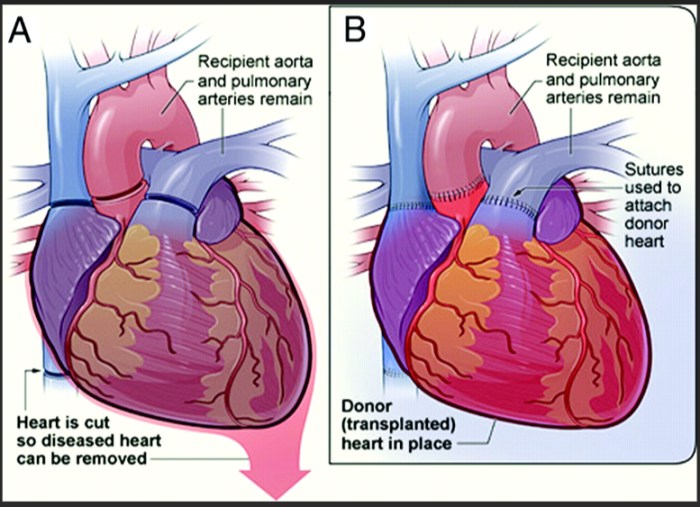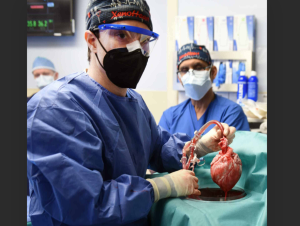Heart transplant surgery is a critical procedure for individuals with severe heart diseases such as cardiomyopathy, coronary artery disease, congenital heart defects, and heart failure. The best heart transplant hospitals in India offer advanced technology, experienced surgeons, and comprehensive post-operative care, ensuring successful outcomes for patients undergoing this essential procedure.
Medical disclaimer: This content is for general awareness and does not replace a doctor’s consultation. For diagnosis or treatment decisions, consult a qualified specialist.

Understanding Heart Transplant
What is a Heart Transplant?
A heart transplant is a surgical procedure where a diseased or failing heart is replaced with a healthy heart from a donor. It is usually considered for patients with severe heart diseases such as cardiomyopathy, coronary artery disease, congenital heart defects, and heart failure.

How Does it Work?
A heart transplant involves replacing a diseased or failing heart with a healthy donor heart. The process starts with a comprehensive evaluation to determine suitability, followed by placement on a waiting list for a matching donor. The surgery, performed under general anesthesia, involves removing the diseased heart and implanting the donor heart. Post-surgery, patients are monitored in the ICU and must take immunosuppressive medications to prevent rejection.
Rehabilitation and regular follow-ups are essential for recovery, while long-term management includes lifestyle adjustments and ongoing monitoring to ensure the new heart remains healthy.

When is a Heart Transplant Necessary?
A heart transplant is necessary when a patient has severe, end-stage heart disease that significantly impairs their quality of life and all other treatments have failed. Common conditions requiring a heart transplant include cardiomyopathy (weakened heart muscle), coronary artery disease (severe blockages leading to heart failure), congenital heart defects (untreatable structural problems from birth), and heart failure (inability to pump enough blood despite medical therapy).
Criteria for Heart Transplantation
Criteria for heart transplantation include severe heart disease with significant impairment, failure of other treatments, good overall health to withstand surgery and post-operative care, no major contraindications such as active infections or recent malignancies, and psychosocial stability with a strong support system for post-transplant care.
Different Types of Heart Transplants
Heart transplants can involve different procedures depending on the patient's condition:
Orthotopic Heart Transplant
An orthotopic heart transplant replaces the patient's diseased heart with a healthy donor heart. This is the most common type of heart transplant, used for severe heart failure or cardiomyopathy. The procedure involves removing the patient's heart and placing the donor heart in the same position, leading to improved heart function and quality of life.
Heterotopic Heart Transplant
A heterotopic heart transplant, or "piggyback" transplant, adds the donor heart to the patient's existing heart. This rare procedure is used for patients with pulmonary hypertension or size mismatch between donor and recipient hearts. It provides additional support to the failing heart by connecting the donor heart to the patient's heart, sharing the workload between the two hearts.
What is heart transplant procedure?
A heart transplant involves replacing a diseased or failing heart with a healthy heart from a donor. Here’s a detailed overview of how the process works:
Pre-Transplant Evaluation Process
Medical Tests: Comprehensive testing including blood tests, imaging studies, cardiac function tests, and evaluations of other organs to assess overall health and suitability.
Psychological Evaluation: Assessment to ensure psychological readiness and adherence to post-operative regimen.
Matching Donor Criteria: Checks for compatibility based on blood type, tissue type, and heart size.
Finding a Suitable Donor Heart
Criteria for Matching:
Blood Type: Must be compatible between donor and recipient.
Size: Donor heart must be of appropriate size relative to the recipient.
Urgency: The recipient’s condition and urgency affect donor heart allocation.
Donor Heart Availability: Hearts are sourced from deceased donors, with availability varying based on location and donation network.
Detailed Surgical Procedure for Heart Transplant
Preparation: Patient is placed under general anesthesia, and the surgical team prepares.
Removal of Diseased Heart: An incision is made in the chest to remove the diseased heart.
Transplanting Healthy Donor Heart: The healthy donor heart is placed, connected to blood vessels and other structures.
Monitoring and Closure: Ensuring proper function and no bleeding, then closing the incision and moving the patient to the ICU.
Post-Transplant Care and Recovery
Monitoring: Close observation to ensure heart function and detect complications.
Medication: Immunosuppressive drugs to prevent rejection, taken as directed.
Regular Follow-Ups: Frequent appointments for heart function tests, medication adjustment, and rejection monitoring.
Top Hospitals for Heart Transplant in India
Leading hospitals in India for heart transplants are renowned for their advanced medical technology, experienced surgical teams, and high success rates. Notable institutions include:
Apollo Hospitals (Chennai): Known for its state-of-the-art facilities and comprehensive heart transplant programs.
Fortis Healthcare (Delhi and Mumbai): Offers exceptional care with specialized heart transplant units and a team of expert surgeons.
Medanta Hospital (Gurgaon): Provides advanced treatment options and personalized care for heart transplant patients.
These hospitals are distinguished by their expertise in performing complex heart transplants and their commitment to patient care.
What is the Heart Transplant Success Rate in India?
Success rates for heart transplants in India have seen significant improvements. Many top hospitals report a survival rate of approximately 85% for the first year post-surgery. This success is attributed to advancements in surgical techniques, immunosuppressive therapies, and comprehensive post-operative care, contributing to improved long-term outcomes and quality of life for heart transplant recipients.
What is the Heart transplant cost in India?
The estimated cost of a heart transplant in India ranges from INR 15,00,000 to INR 30,00,000 (approximately USD 20,000 to USD 40,000). This range covers pre-transplant evaluations, surgery, post-operative care, and medication costs. It’s important to note that individual costs may vary based on specific circumstances and hospital policies.
For a detailed cost estimate tailored to individual cases, it is recommended to consult with the chosen transplant hospital or medical provider.
Factors Influencing the Cost of Heart Transplant Surgery
The cost of heart transplant surgery in India is influenced by several factors, including Hospital and Surgeon Fees, Pre-Transplant Evaluation, Surgical Procedure, Post-Transplant Care, Medication Costs, Insurance Coverage
Explore a detailed breakdown of heart transplant cost in India by visiting our in-depth guide heart transplant cost in India.
Preparing for a Heart Transplant
Steps to Take Before the Surgery
Understanding the Process: Gaining a thorough understanding of the transplant procedure, potential risks, benefits, and post-operative care requirements.
Communicating with Medical Professionals: Engaging in open and honest communication with the medical team to address any concerns or questions.
Managing Expectations: Being realistic about the challenges and recovery process involved in a heart transplant.
Preparing Mentally and Physically
Maintaining a Healthy Lifestyle: Adopting healthy habits such as a balanced diet, regular exercise, and avoiding harmful substances like tobacco and alcohol.
Building a Support System: Enlisting the help of family, friends, and support groups to provide emotional support and practical assistance during the pre- and post-transplant period.
Addressing Psychological Concerns: Seeking counseling or therapy to manage anxiety, depression, or other psychological challenges that may arise before or after the transplant.
Understanding Potential Risks and Complications
Rejection of the New Heart: The body’s immune system may recognize the new heart as foreign and attempt to reject it, despite immunosuppressive medications. Close monitoring and prompt intervention are essential.
Infection Risk: Immunosuppressive drugs increase susceptibility to infections. Preventive measures, regular screenings, and prompt treatment of infections are critical.
Other Possible Complications:
Blood Clots: Can form in blood vessels, leading to complications such as stroke or heart attack.
Kidney Damage: Long-term use of immunosuppressive drugs may affect kidney function.
Cancer: Increased risk of certain cancers due to long-term immunosuppression.
Best Heart Transplant Surgeons in India
India is home to some of the most skilled and experienced heart transplant surgeons in the world. Renowned for their expertise and state-of-the-art medical facilities, these specialists provide exceptional care to patients in need of heart transplants. Dr. Ramakanta Panda, a leading heart surgeon, has performed numerous successful heart transplants, making him one of the top experts in the field.
Patient Care and Post-Operative Support
What Happens After the Surgery?
Immediate Post-Surgery Care: Patients are transferred to the ICU for close monitoring of heart function, blood pressure, oxygen levels, and signs of complications. The medical team ensures stability and addresses any immediate post-surgery issues.
ICU Stay Duration: Varies based on individual recovery and absence of complications. Typically, patients stay in the ICU for several days to a week.
Transition to General Ward: Once stable, patients move to a general ward for continued monitoring and recovery.
Follow-Up Appointments and Routine Tests
Regular Follow-Ups: Frequent check-ups are essential, especially in the first few months post-transplant, to monitor heart function, detect rejection, and adjust medications.
Biopsies: Periodic heart biopsies to assess for rejection. This involves taking small tissue samples from the heart to examine under a microscope.
Imaging Studies: Echocardiograms, X-rays, and other imaging tests to monitor heart health and detect any issues.
Life After Heart Transplant Surgery
Medication Adherence: Strictly following the prescribed medication regimen is crucial to prevent rejection and maintain overall health. Immunosuppressive medications must be taken as directed without missing doses.
Healthy Lifestyle: Adopting a heart-healthy lifestyle, including a balanced diet, regular exercise, and avoiding smoking and alcohol, supports the health of the transplanted heart and overall well-being.
Emotional and Psychological Support: Continuing emotional and psychological support is important for adjusting to life post-transplant. Ongoing counseling, support groups, and mental health care help patients manage emotional challenges and build resilience.
How Long Does It Take to Recover from a Heart Transplant?
The recovery time after a heart transplant varies based on several factors, including the patient's age and how well they follow medical advice. Most patients fully recover within three to six months post-surgery.
Will I Be on Medication for the Rest of My Life?
Yes, after a heart transplant, lifelong medication is necessary. The most critical medication is an immunosuppressant to prevent your body from rejecting the new heart. Additionally, you will need medications to maintain healthy blood pressure and cholesterol levels and to prevent infections. Supplements and vitamins may also be recommended to ensure your body receives all necessary nutrients.
Will I Still Be Able to Engage in Physical Activity?
For the first three months after a heart transplant, you should avoid strenuous activities such as heavy lifting or intense exercise. After this initial recovery period, you can gradually increase your activity level. Listen to your body and build your strength and endurance over time. It's essential to discuss a suitable physical activity plan with your healthcare provider.
Why Should I Consider India for My Heart Transplant?
One of the primary reasons to consider India for your heart transplant is the significant financial savings. The cost of a heart transplant in India is a fraction of the cost in the United States and is generally lower than in many other countries. Despite the lower cost, the quality of care is not compromised. Indian cardiac surgeons are among the best-trained professionals globally, employing cutting-edge research and state-of-the-art technology to provide top-notch care.
Can I Have Sex After a Heart Transplant?
Resuming a normal sex life after a heart transplant is not only possible but expected. Avoid positions that put pressure on the wound site for at least three months. When resuming sexual activity, watch for any signs of abnormal pain, numbness, or dizziness, and contact your doctor if these symptoms occur. Practicing safe sex is crucial since anti-rejection medications lower your immune system, increasing the risk of infections.
Success Stories of Heart Transplant Patients
Many patients lead healthy lives post-transplant.
Heart Transplant Patient Success Story- Mr. Ashok Chugani, a 56 year old man
Heart Transplant Surgery | Success Story - Mr. Abhishek Goswami
Heart and Lung Transplantation | Success Story - Mr. Hanifa
Frequently Asked Questions (FAQs) about Heart Transplant
What is the success rate of heart transplants in India?
Around 85% for the first year.
How long is the waiting period for a heart transplant in India?
It varies, often several months to a year.
What is the cost of a heart transplant in India?
₹15 lakh to ₹25 lakh.
What are the eligibility criteria for a heart transplant?
Criteria include severe heart failure and no other medical conditions that would complicate the surgery.
What is the recovery time after a heart transplant?
Typically 3 to 6 months.
What are the risks and complications associated with heart transplants?
Include rejection, infection, and side effects of medications.
How do I find a suitable donor for a heart transplant in India?
Through hospitals and organ donation registries.
What kind of post-transplant care is required?
Includes medication, regular check-ups, and lifestyle changes.
Are heart transplants covered by insurance in India?
Some insurance plans cover it; check with your provider.
Where can I find support groups for heart transplant patients in India?
Hospitals and online communities offer support groups.
Resources and Support for Heart Transplant Patients
Heart Transplant Support Groups and Communities in India
Available through hospitals and online forums.
Further Reading and Information on Heart Transplants
Refer to medical journals, hospital websites, and transplant organizations.